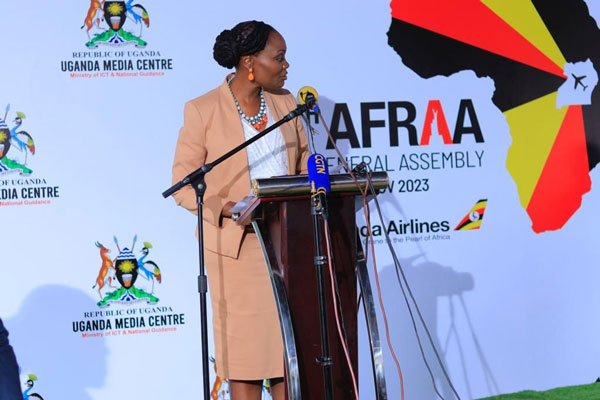
Kampala, Uganda | THE INDEPENDENT | Uganda is set to host the 55th African Airlines Association (AFRAA) Annual General Assembly this year, amidst complaints by the national carrier over alleged unfair trade practices in the content industry.
Uganda Airlines Chief Executive, Jennifer Bamuturaki lists bureaucracy by states as one of the impediments to its route expansion and the general growth of the African aviation industry.
Uganda Airlines has in recent times faced threats to its flights in some countries over the renewal of landing rights but has managed to have them resolved before disruptions.
The airline also has several pending requests for landing rights as it moves to increase its destination network in Africa and on the international scene.
Bamuturaki says that on top of her agenda as AFRAA President is to tackle such challenges as well as the single air-space initiative (Yamoussoukro Agreement) so as to improve the aviation connectivity on the continent, and hopes the November AGA will tackle them.
The Yamoussoukro agreement, an idea mooted more than two decades ago is aimed at ensuring that states allow airlines from within member states to operate through their airports with more rights than non-member state airlines.
However, this has never been realized and in 2018, the African Union facilitated the formation of the Single African Air Transport Market (SAATM), to enhance air connectivity across the continent, inducing competition and job creation.
To become operational, the concept needed at least 40 countries to sign up to it, at least by 2019.
However, to date, only 35 countries have signed up and committed and Uganda is one of the 20 yet to join the initiative.
But Abderahmane Berthe, the AFRAA Secretary General says even the signatories are yet to fully implement the decision’s provision, which is keeping the continent’s connectivity back.
The initiative mainly urges the states to grant Fifth Freedom Rights, the right or privilege, in respect of scheduled international air services, granted by one State to another State to put down and to take on, in the territory of the first State, traffic coming from or destined to a third State.
It is the freedom to carry traffic between two foreign countries on a flight that either originated in or is destined for the carrier’s home country.
Secretary General Berthe says the states, especially those with smaller airlines, are reluctant to adopt this because they are afraid of the likelihood that bigger airlines from other countries would outcompete them.
He, however, says the fear is uncalled for because, in regions where it is being applied, there have been no adverse consequences to any airlines.
General Edward Katumba Wamala, the Minister for Works and Transport, said it is such kinds of impediments that are keeping air travel in Africa very expensive. According to records, only 10 percent of Ugandans can afford an air ticket.
General Wamala says the aviation industry on the continent cannot grow when in some instances connectivity between African countries takes is impossible without stopping over in another continent.
The 55th AGA to be held at Munyonyo is expected to attract 500 delegates from African airlines companies but also aviation authorities from within and outside the continent, according to the hosts.
Wamala says the choice of Uganda to host, as well as the election of Bamuturaki as AFRAA president, give confidence to the airline that it is on the right path to development and that it should give a new incentive to market the company and the country internationally.
****
URN
 The Independent Uganda: You get the Truth we Pay the Price
The Independent Uganda: You get the Truth we Pay the Price



